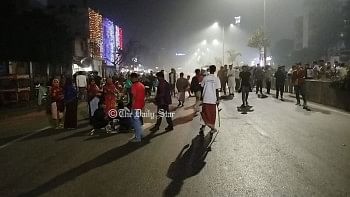The five Bangalee love languages

Most of us have probably heard of the five love languages by Gary Chapman – words of affirmation, quality time, acts of service, gifts, and touch – the different ways of expressing love and how it varies from person to person. In retrospect, it may also vary from culture to culture, and I recently came to realise what the different Bangalee love languages are, and how we Bangalees demonstrate love to our close ones in contrast to the globally affirmed love languages we have all come to learn. So, without further ado, presenting to you, the Bangalee love languages!
The first one would most definitely be "Bhaat khabi" ("Want to have rice")? Every child has heard this from their parents at some point in their lives – when their parent has yelled at them, called them names, and maybe also said, "Tor moton ekta shontan thakar cheye na thaka bhalo" ("It is better to not have a child than to have one like you"). That burst of anger, when it ultimately settles down, is usually met with a "Bhaat khabi?" One has to understand the emotion of bhaat and what its essence is to a Bangalee. Bhaat is, for the lack of a better word, unabashed love. And while the quantity and quality of bhaat may differ from household to household, bhaat is a must-have at least once a day, if not more, in every Bangalee family's meal plan. Now, bhaat may be accompanied by meat, daal, salad, the works, but when you want to make a peace offering, you offer bhaat. While this love language is usually between a parent and a child, it could very well translate to romantic relationships. I am still trying to analyse what those different nuances could look like.
Now, imagine if it is June/July. Summer time, which equals mango time. The love language, as one would presume, would also differ from season to season, and so very quickly bhaat can be replaced by aam (mango), and thus become "Aam khabi?" ("Want to eat mango?"). When parents are even more deeply guilty for a specific behaviour, they would go down the aam road. Let's also be clear that there is no saying sorry or thank you in Bengali culture, nor is there a tradition of saying "I love you" to express love to our close ones, although this sentiment might differ when it comes to romantic couples. One might be wondering if all Bangalee love languages are related to food. But that's not the case. While food is an epitome of expressing love, we Bangalees do have some more forms of expressions up our sleeves! I invite you to continue reading, dear readers.
I recently came to realise what the different Bangalee love languages are, and how we Bangalees demonstrate love to our close ones in contrast to the globally affirmed love languages we have all come to learn.
Since I have up until now only delved into aromantic forms of relationships, let us get into the deep, the dark – the love language of couples. The first and foremost in this case would be "Pic pathao" ("Send me a photo"). And while the content of the photo may vary from couple to couple, or what time of the day it is, or the relationship between two individuals, saying "I love you" is best replaced by "Pic pathao." And the rawer the photo is, the deeper one's love can be felt.
Another one of my favourites would be getting the bill for something that your partner has purchased. It could be clothes, it could be groceries, it could be the bill at a restaurant. As soon as the receipt arrives, if you take out your wallet from your front pocket/bag, and take out those fresh Tk 500 notes, and say "I got this," this shows love is like love unknown. Welcome, dear readers, to the world of adult loving.
Last but not the least, the most intense and selfless act of showing love would be when you share your social media passwords with your partner. When your partner knows your Facebook and email passwords, it means that you have nothing to hide, and that you would go to the end of the world for the other person and be faithful for ever after. Now remember, these practices might not be approved by global lovers, but to us Bangladeshis, well, we just hit differently. So, the next time you do not want to say those three words to your partner, try one of the above and make 'em feel loved. Good luck!
Syeda Samara Mortada, a feminist activist, is co-founder of Bonhishikha, a feminist organisation working to unlearn gender and create a platform for the youth to share their gender-based experiences.



 For all latest news, follow The Daily Star's Google News channel.
For all latest news, follow The Daily Star's Google News channel. 





Comments